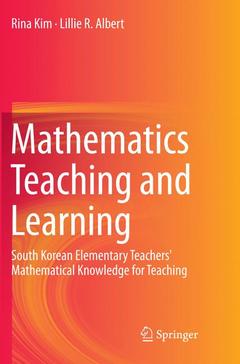Mathematics Teaching and Learning, Softcover reprint of the original 1st ed. 2015 South Korean Elementary Teachers' Mathematical Knowledge for Teaching
Auteurs : Kim Rina, Albert Lillie R.

Rina Kim has Ph. D in Curriculum and Instruction from Boston College. She works as an elementary school teacher in South Korea and teaches courses in mathematics education at Seoul National University of Education. Her academic focus is mathematics education at the elementary level. Her research interests also include using technology to improve the quality of mathematics instruction. She has published her research in leading journals in her field and presented papers at major research conferences. Her other recent book is Reading, Writing, and Discussing at the Graduate Level: A Guidebook for International Graduate Students coauthored with Lillie R. Albert and Hang Gyun Sihn.
Lillie R. Albert, an associate professor at Boston College Lynch School of Education, has a Ph.D. in Curriculum and Instruction from the University of Illinois at Urbana-Champaign. Her research focuses on the influence that sociocultural historic contexts have on learning and development of learners across the lifespan. Her specialization includes the exploration of the relationship between the teaching and learning of mathematics and the use of cultural and communicative tools to develop conceptual understanding of mathematics, which includes collaborating with mathematics education scholars at Seoul National University of Education, Seoul, South Korea to explore government policies in supporting the preparation of mathematics teachers. She has published her research in leading national and international journals in her field and presented papers at major research conferences. Her other recent books are Rhetorical Ways of Thinking: Vygotskian Theory and Mathematical Learning, in collaboration with Danielle Corea and Vittoria Macadino and Reading, Writing, and Discussing at the Graduate Level: A Guidebook for International Graduate Students coauthored with Rina Kim and Hang Gyun Sihn.
Provides specific examples of how the teachers applied the various types of knowledge
Contains models illustrating the relationship among different types of knowledge for teaching mathematics
Includes a special chapter on the educational context of South Korea
Includes supplementary material: sn.pub/extras
Date de parution : 10-2016
Ouvrage de 152 p.
15.5x23.5 cm
Disponible chez l'éditeur (délai d'approvisionnement : 15 jours).
Prix indicatif 52,74 €
Ajouter au panierDate de parution : 04-2015
Ouvrage de 152 p.
15.5x23.5 cm
Disponible chez l'éditeur (délai d'approvisionnement : 15 jours).
Prix indicatif 52,74 €
Ajouter au panier

